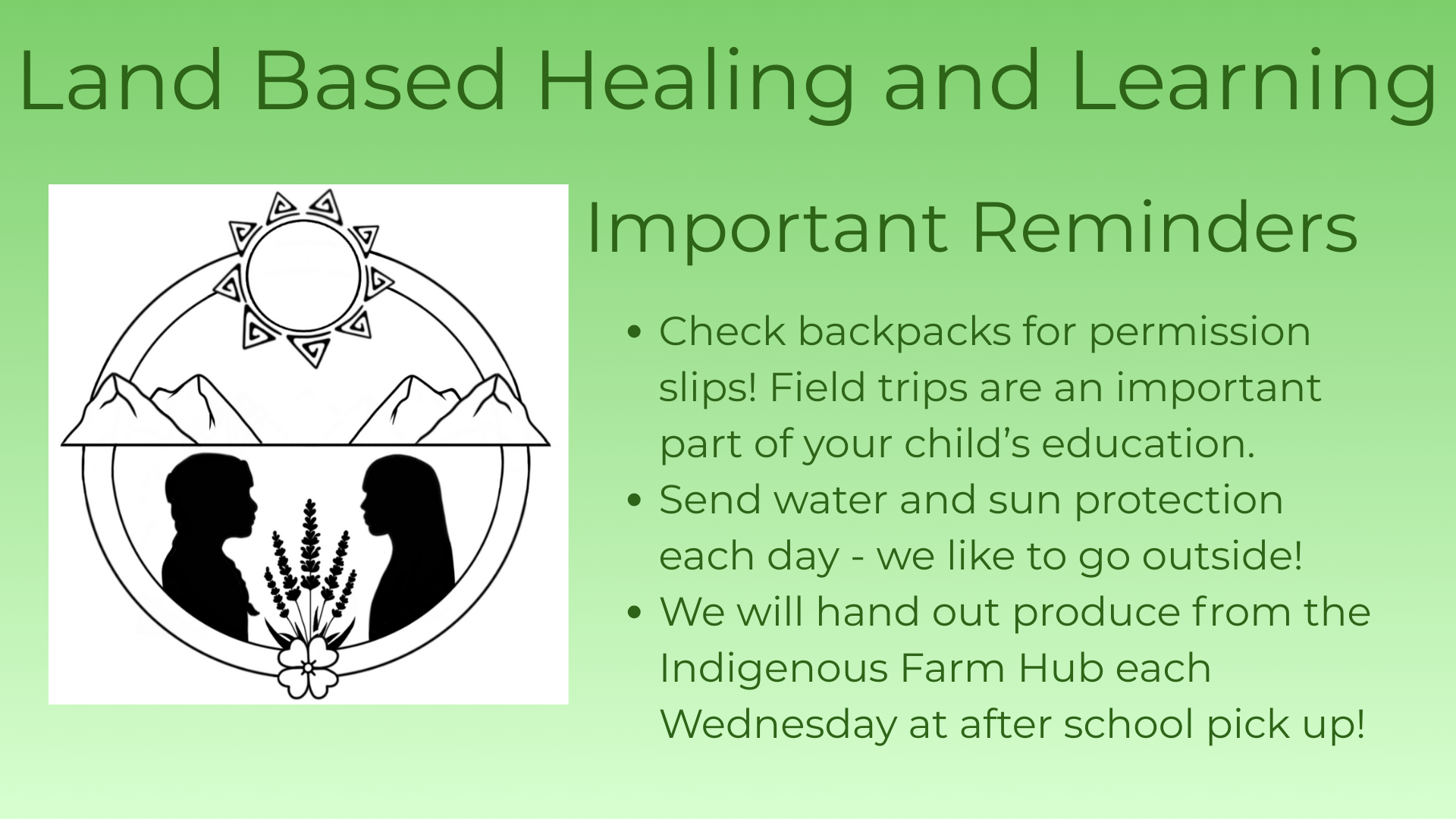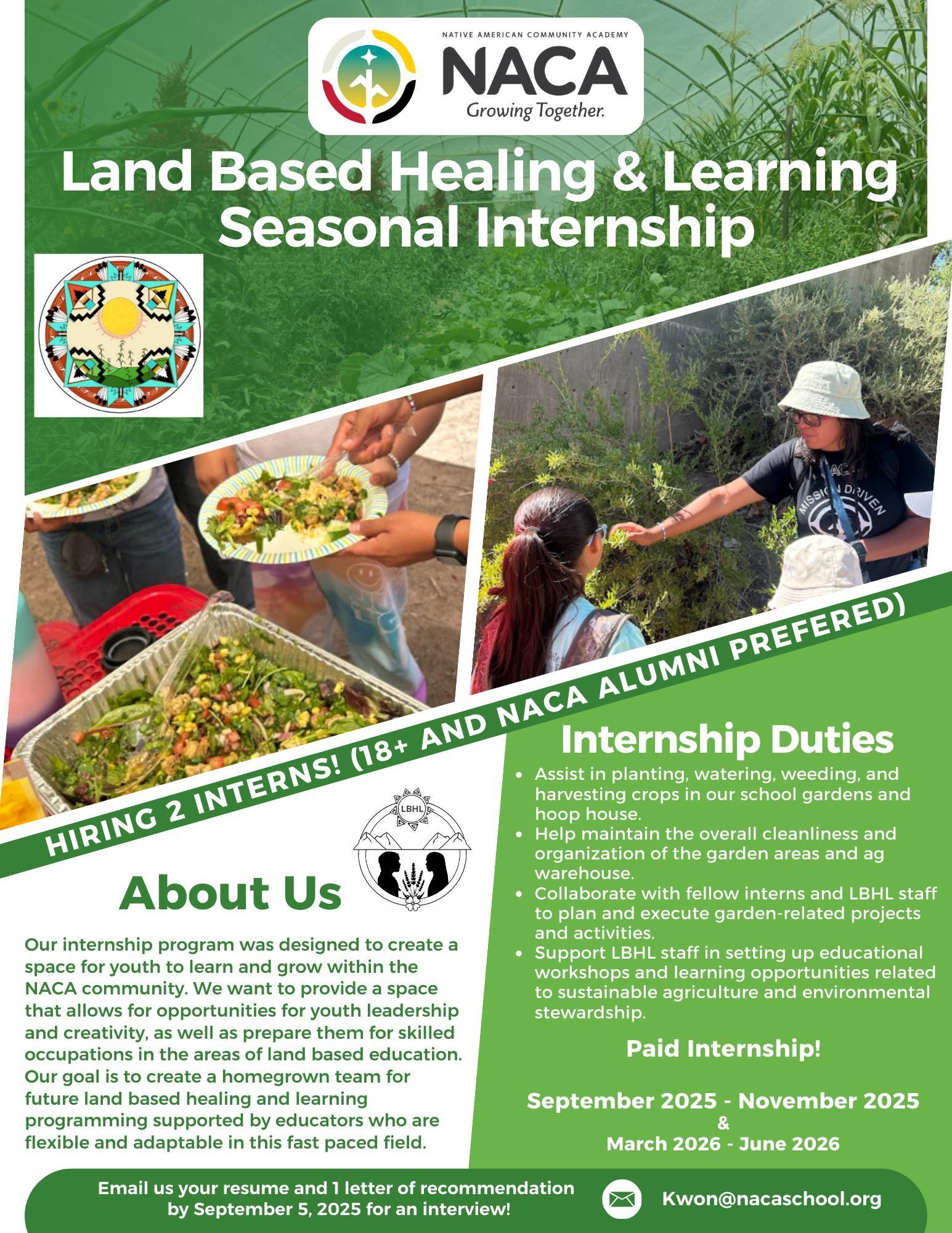Land-Based Healing & Learning
Mission: Strengthening our kinship with lands and waters to support the community in reclaiming our identity as beings who are integral to the ecology. We work to provide exposure and awareness to indigenous ways of knowing, allow space for application, and then support creation and design.
Goal Statement:
- Grow children who are in good relation with the land and waters and know their responsibilities and gifts to the community
- Provide support to staff to be well trained, inspired, and empowered to practice LBHL in the classroom and field
- Develop sustainable programming that honors our relationships with communities and families, feeds our children healthy foods, and empowers civic engagement
- Create and maintain safe outdoor learning spaces that are alive and can adapt with the changing ecosystem
- Create a series of land based learning tracks, rooted in indigenous epistemologies, designed to supplement student’s learning development as they move on to college and/ or careers
Community Educators: We work with regional experts to offer insight, local expertise, traditional ecological knowledge and/or skill sets in terms of local history, cultural practices, economy, ecology, science, etc. These experts work in collaboration with educators and NACA staff to augment localized, decolonized and indigenized curriculum.
Grounding Sites: We partner with community based organizations who have access to land around our school. Educators and students return to these grounding sites multiple times over the course of their education to develop seasonal relationships with land, water, plants, animals, etc. Please contact us if you have suggestions for appropriate grounding sites or if you would like to learn more about these sites
LBHL Programming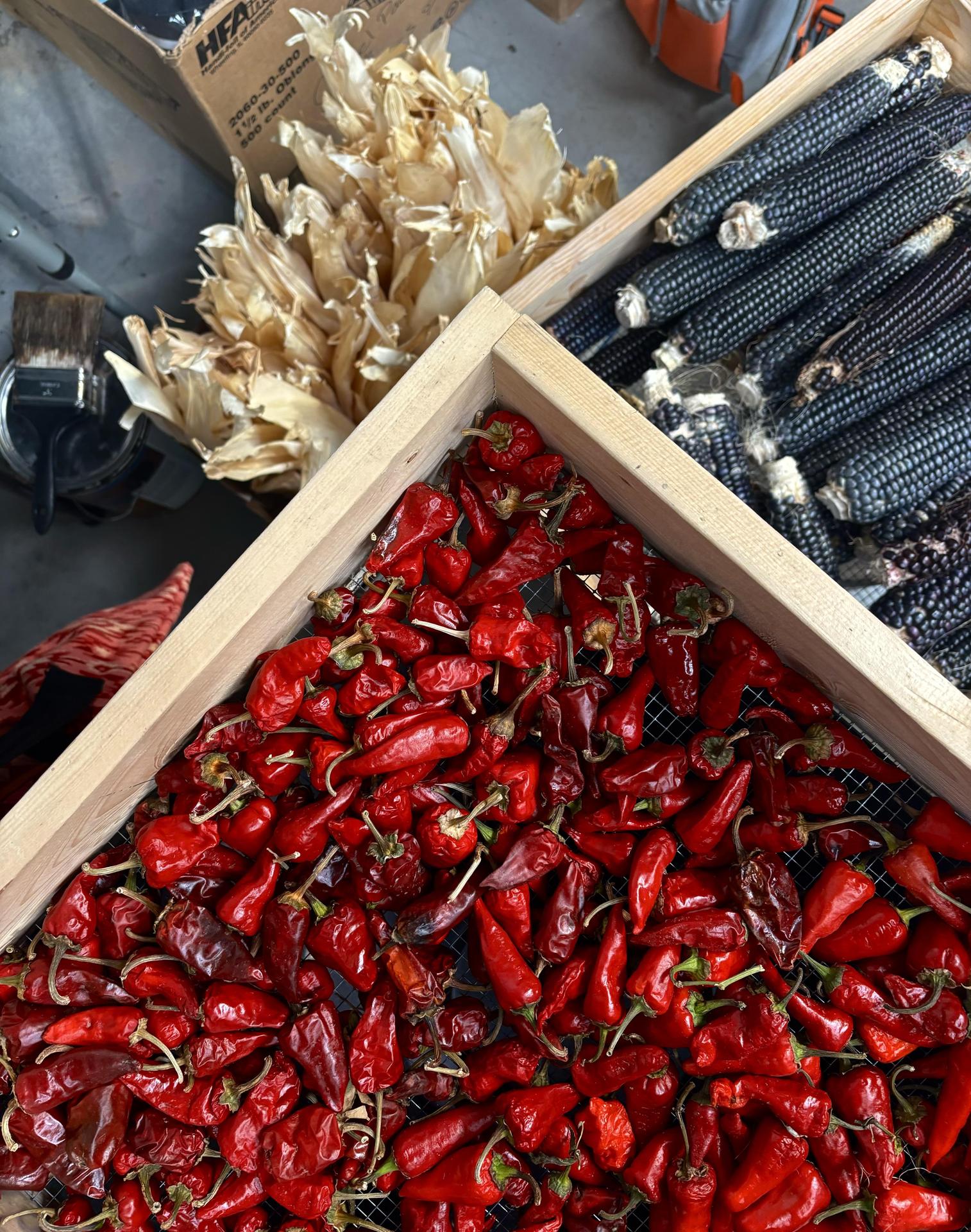
We provide a variety of mission driven programming that support multiple interests across our school.
- Food and Medicine
- Mountain and Water
- Community Educator
- Wellness Fridays
- Indigenous Science
- Experiential Education
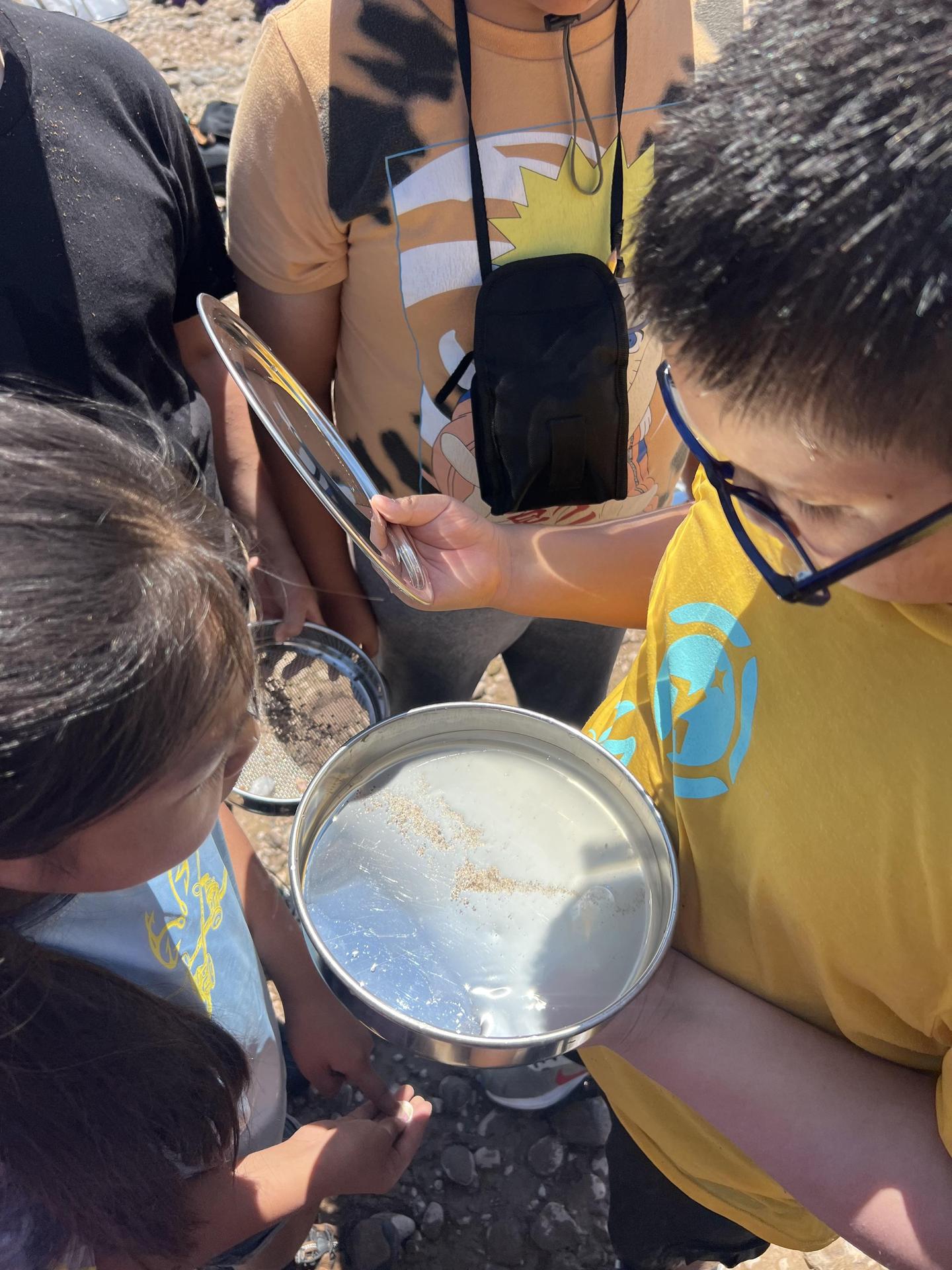
Elementary School
We support elementary school teachers with a land based science program which includes garden lessons and field trips for grades K to 5th. Our elementary liaison will work closely with teachers and the rest of our team to align elementary experiences and learning with the NACA mission.
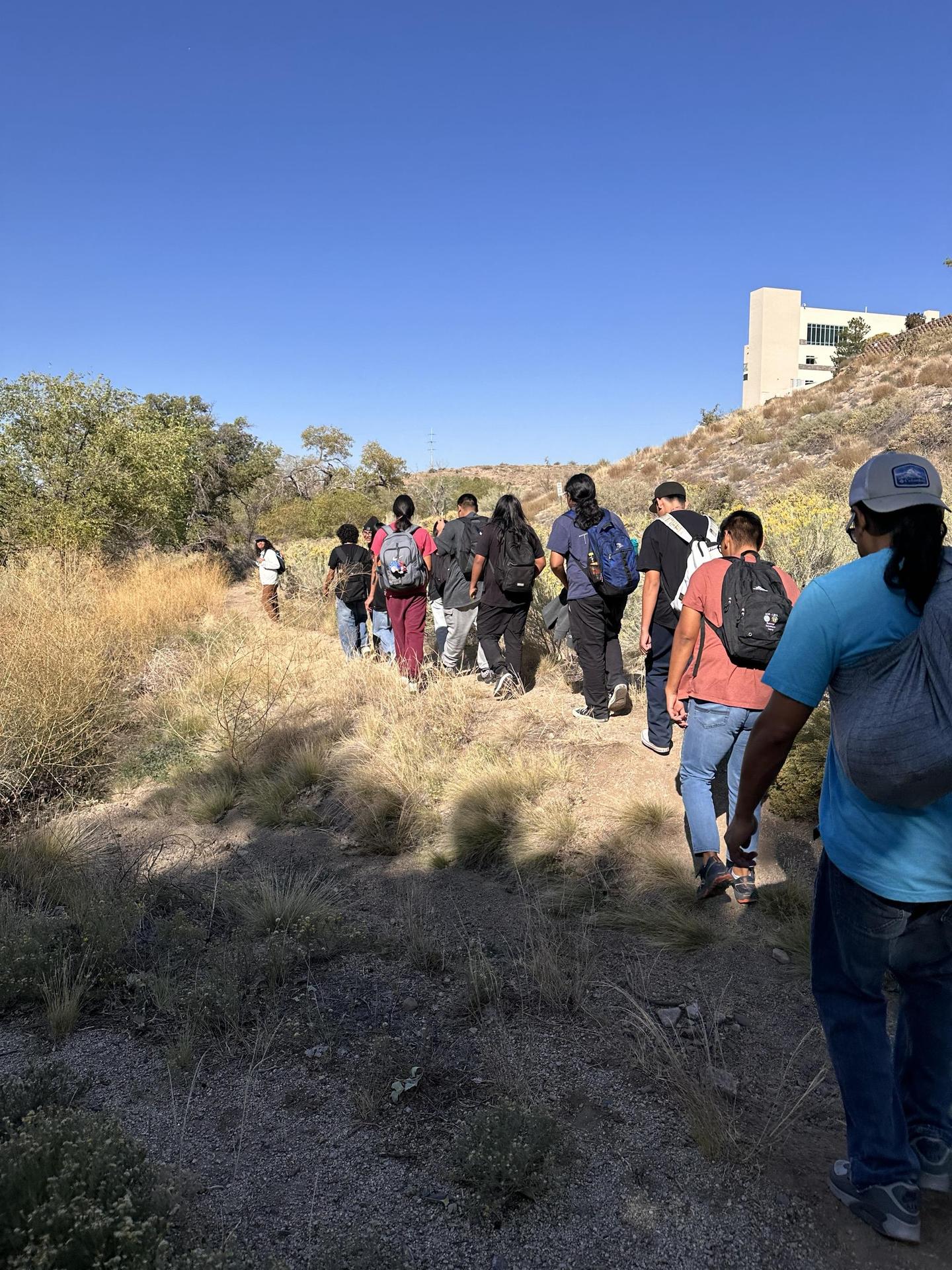
Middle School
We work with a range of partners and grounding sites to create rich learning experiences for students and staff. The experiential education field trip program, in alignment with developing graduate profiles, aims to enhance the learning experiences of students in grades 6-8 by providing quarterly outings that connect them with a diverse range of community partners and places. These outings will offer hands-on learning opportunities, foster community engagement, and enrich the curriculum by immersing students in real-world contexts.
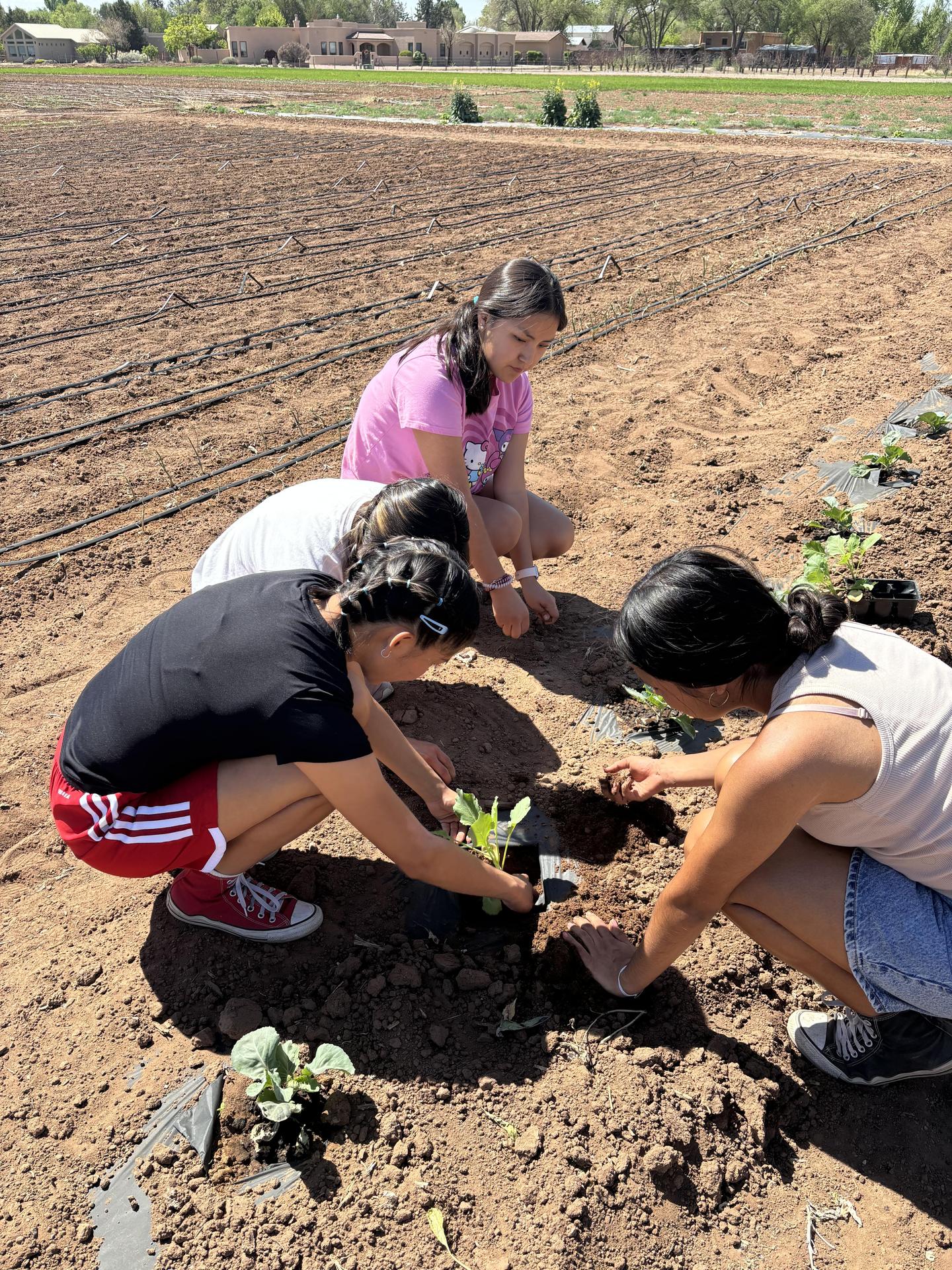
High School
Our land-based experiential education program is designed to immerse high school students in hands-on learning experiences centered around college and career tracks related to water, food, medicine, mountain restoration, land management, and landscape architecture. Land fam is working with community partners to develop and foster learning relationships between students and community experts. Through a combination of outdoor expeditions, community fieldwork, and mentorship, students will gain practical skills, knowledge, and insights into these critical areas while fostering a deep connection with the environment and community.
Internships
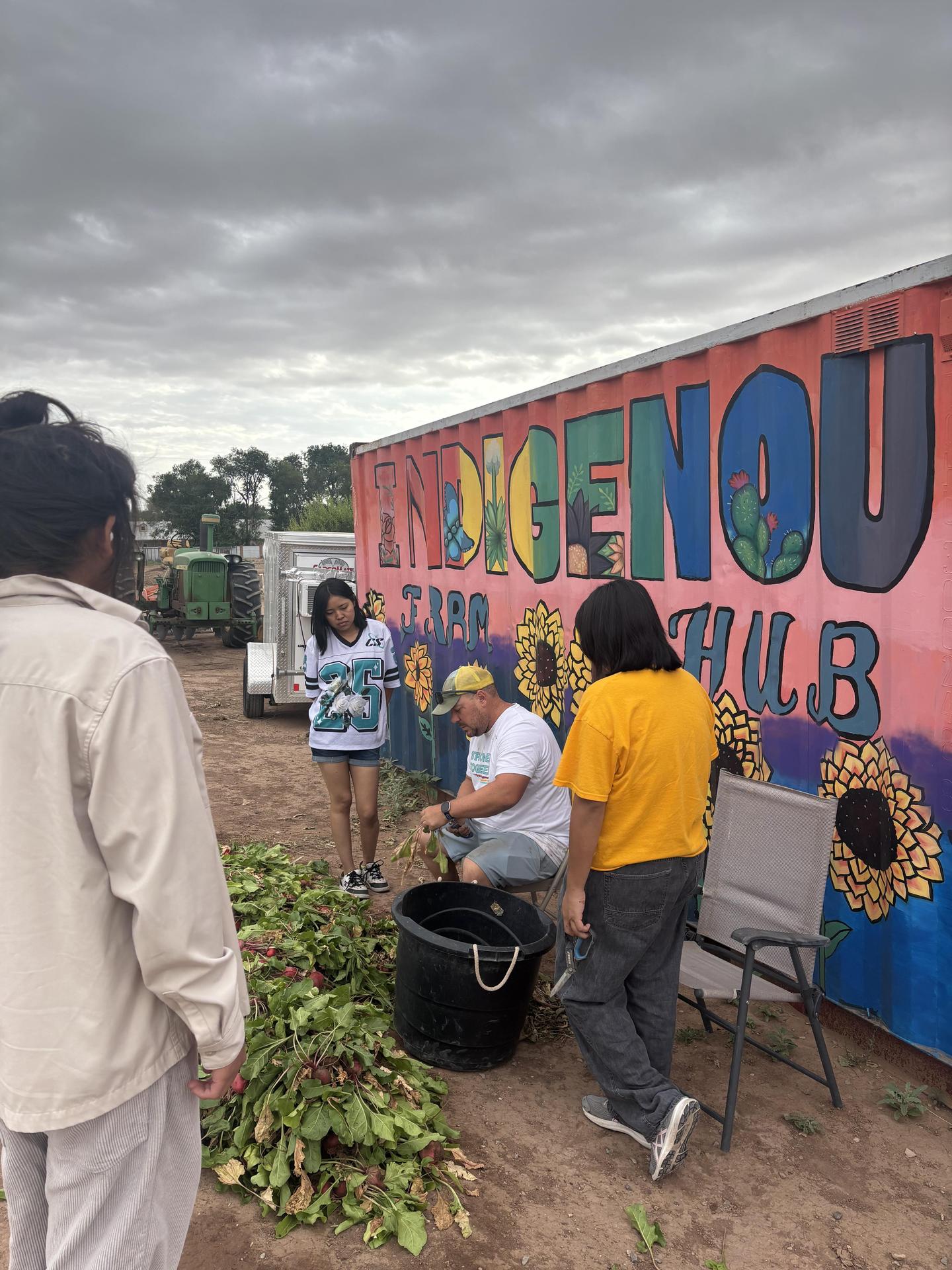
Our internship program was designed to create a space for youth to learn and grow within the NACA community. We want to provide a space that allows for opportunities for youth leadership and creativity, as well as prepare them for skilled occupations in the areas of land based education. In partnership with the Indigenous Farm Hub, we are creating a framework for a robust land based curriculum with input from our youth. Our goal is to create a homegrown team for future land based healing and learning programming supported by educators who are flexible and adaptable in this fast paced field.
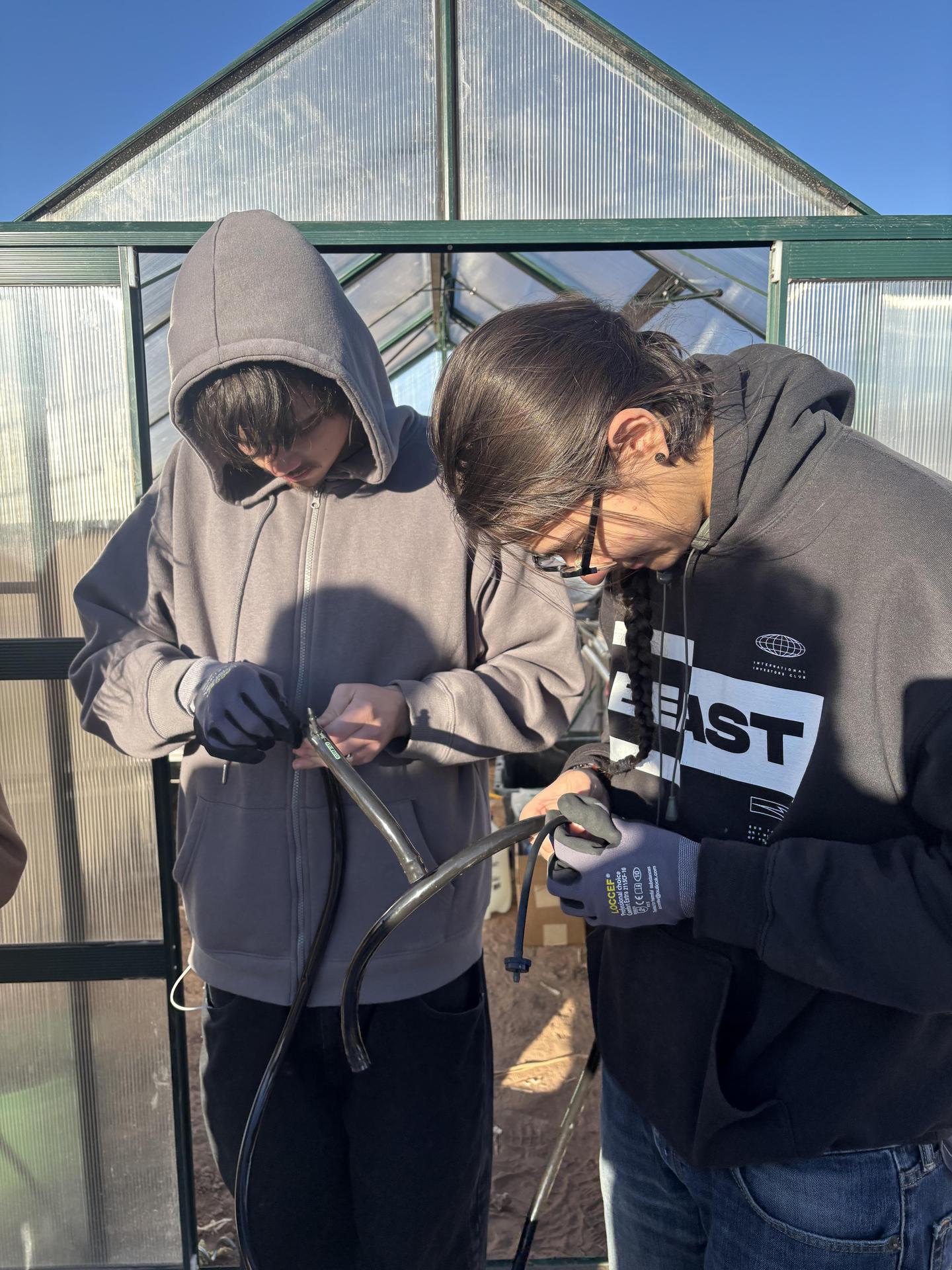
Program Structure:
Seeds are junior 16 to 18 year old interns or dual credit students who help with garden and farm care.
Sprouts are 18+ NACA Students or alum who stay on to help us over the summer with our gardens and at the farm.
Saplings are apprentices who go on to be educators, teachers, or professionals in land based pathways.
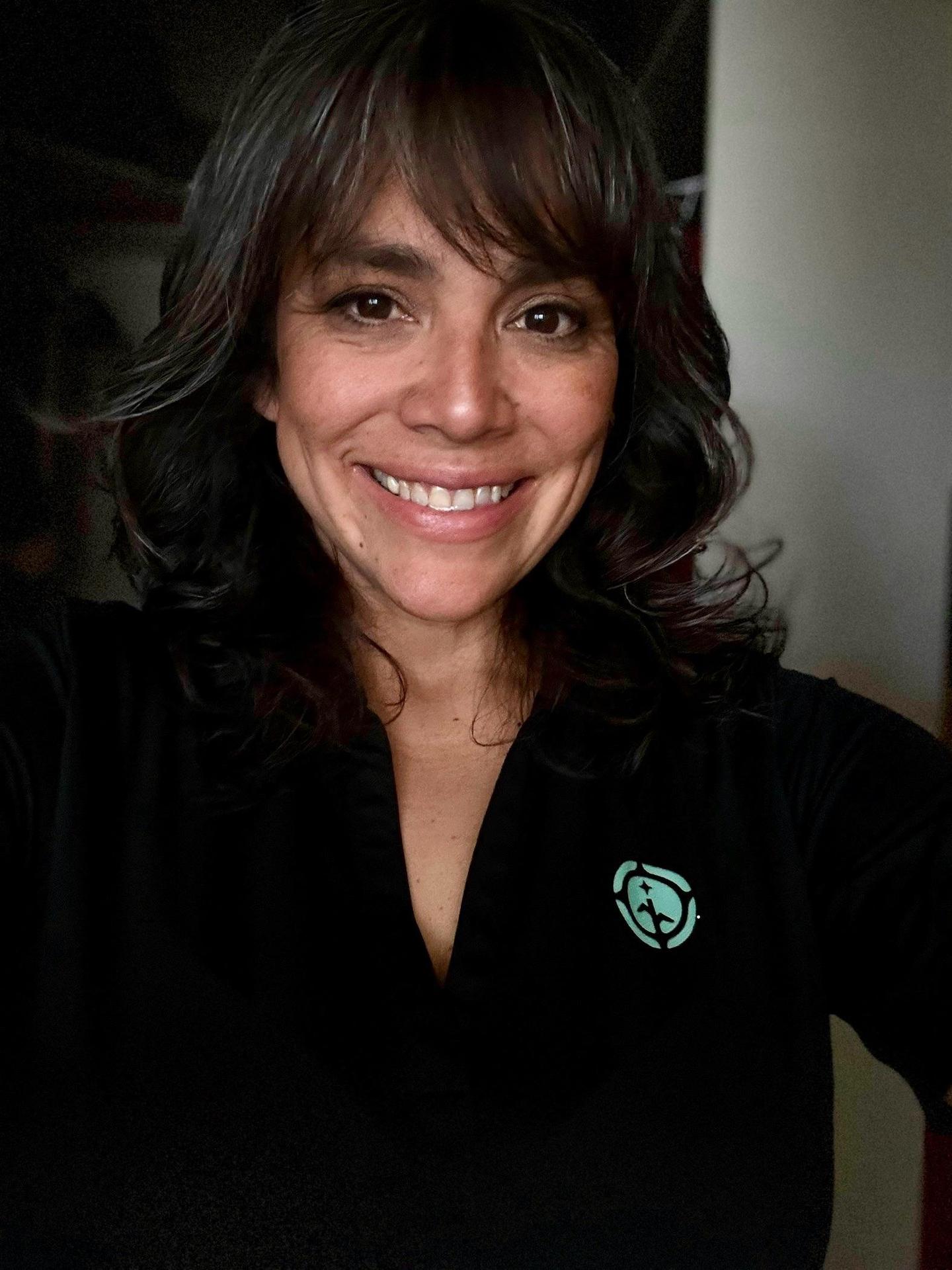 Hatso, My name is Alice Tsoodle and I come from the Kiowa and Cherokee people of Oklahoma. I grew up in New Mexico and Oklahoma and started my family there, eventually moving to Colorado. I began my academic career at the University of Colorado Boulder, studying Environmental Sciences. I transferred into University of Washington Bothell as a senior and achieved a Bachelor's degree in Environmental Studies while raising three babies. From there I went on to Islandwood, earning a certificate in Education for Environment and Community. I finished my Masters in Education degree at University of Washington Seattle, studying Curriculum and Instruction and earning a certificates in Restoration Ecology and Permaculture. Throughout college, I contracted in various urban indigenous communities, working with children to reclaim their relationships with their identity in collaboration with the local land and waters. Some of these organizations include; Red Eagle Soaring, Na’Ah Illahee Fund, and Sealaska. I worked in non-profit outdoor Environmental Education, then worked as a lab assistant and program manager for Dr. Megan Bang in Learning Sciences. I came to NACA during the pandemic as a middle school science teacher. From there I started working with the land based healing and learning team, first working to build structure around the already amazing work happening. I am proud to be part of this school and continue to learn from the children and community around me. Aho
Hatso, My name is Alice Tsoodle and I come from the Kiowa and Cherokee people of Oklahoma. I grew up in New Mexico and Oklahoma and started my family there, eventually moving to Colorado. I began my academic career at the University of Colorado Boulder, studying Environmental Sciences. I transferred into University of Washington Bothell as a senior and achieved a Bachelor's degree in Environmental Studies while raising three babies. From there I went on to Islandwood, earning a certificate in Education for Environment and Community. I finished my Masters in Education degree at University of Washington Seattle, studying Curriculum and Instruction and earning a certificates in Restoration Ecology and Permaculture. Throughout college, I contracted in various urban indigenous communities, working with children to reclaim their relationships with their identity in collaboration with the local land and waters. Some of these organizations include; Red Eagle Soaring, Na’Ah Illahee Fund, and Sealaska. I worked in non-profit outdoor Environmental Education, then worked as a lab assistant and program manager for Dr. Megan Bang in Learning Sciences. I came to NACA during the pandemic as a middle school science teacher. From there I started working with the land based healing and learning team, first working to build structure around the already amazing work happening. I am proud to be part of this school and continue to learn from the children and community around me. Aho 
My name is Victoria (Viktoryia) Martine. I was born and raised in Albuquerque, New Mexico. I am half Navajo and half Pueblo: Laguna, Zia, Zuni, and Santo Domino. I’m a NACA Alum, graduated in 2018. I have a bachelor's in planning and design with a concentration in landscape architecture and a Minor in Sustainability from the University of New Mexico in 2023. I decided to come back to NACA in 2020 where I helped launch the NACA Gardens and started in OST leading the Garden Warriors and Art Club during COVID. I then left in 2021 for a Landscape architecture internship called MRWM at the time and is now called Pland Collaborative. In 2022 I decided that really love working with students and combining land-based healing and learning in the classrooms. I wish I had more opportunities like LBHL when I was a student at NACA. I'm very grateful to be part of a new era here at NACA and can’t wait to see where this new path takes me.
 Han mitakuyapi. Cante was’te nape ciyuzapi ye. Hello everyone, my name is Maya Kwon. I am Dakota from the Sisseton Wahpeton Oyate and was born and raised on the Lake Traverse Reservation in South Dakota. My family roots entwine multiple cultures and backgrounds as my maternal grandparents are Mexican and Irish and my paternal grandparents are Dakota and Paiute. I attended Tiospa Zina Tribal School starting from Kindergarten all the way through graduating from high school. I hold that experience very close to my heart as it was there my love for Indigenous education blossomed. My passion for education and tribal nations led me to the University of New Mexico to obtain a bachelor’s degree in Native American Studies and to the University of Minnesota-Duluth to earn a Masters in Tribal Administration and Governance (MTAG). I have worked for my tribal government, the federal government, and most recently for a local accounting firm. Throughout my career I have always found myself working with budgets, grants, and numbers. I come to NACA eager to learn more about Land-Based Healing and Learning and to offer my skills to the school and local community. Outside of work I love to sing, visit the library, stay active with yoga and running, explore Albuquerque, and spend quality time with my family and friends. In addition to being a doting mother and wife I consider myself to be a loving dog mom and hummingbird caretaker.
Han mitakuyapi. Cante was’te nape ciyuzapi ye. Hello everyone, my name is Maya Kwon. I am Dakota from the Sisseton Wahpeton Oyate and was born and raised on the Lake Traverse Reservation in South Dakota. My family roots entwine multiple cultures and backgrounds as my maternal grandparents are Mexican and Irish and my paternal grandparents are Dakota and Paiute. I attended Tiospa Zina Tribal School starting from Kindergarten all the way through graduating from high school. I hold that experience very close to my heart as it was there my love for Indigenous education blossomed. My passion for education and tribal nations led me to the University of New Mexico to obtain a bachelor’s degree in Native American Studies and to the University of Minnesota-Duluth to earn a Masters in Tribal Administration and Governance (MTAG). I have worked for my tribal government, the federal government, and most recently for a local accounting firm. Throughout my career I have always found myself working with budgets, grants, and numbers. I come to NACA eager to learn more about Land-Based Healing and Learning and to offer my skills to the school and local community. Outside of work I love to sing, visit the library, stay active with yoga and running, explore Albuquerque, and spend quality time with my family and friends. In addition to being a doting mother and wife I consider myself to be a loving dog mom and hummingbird caretaker. 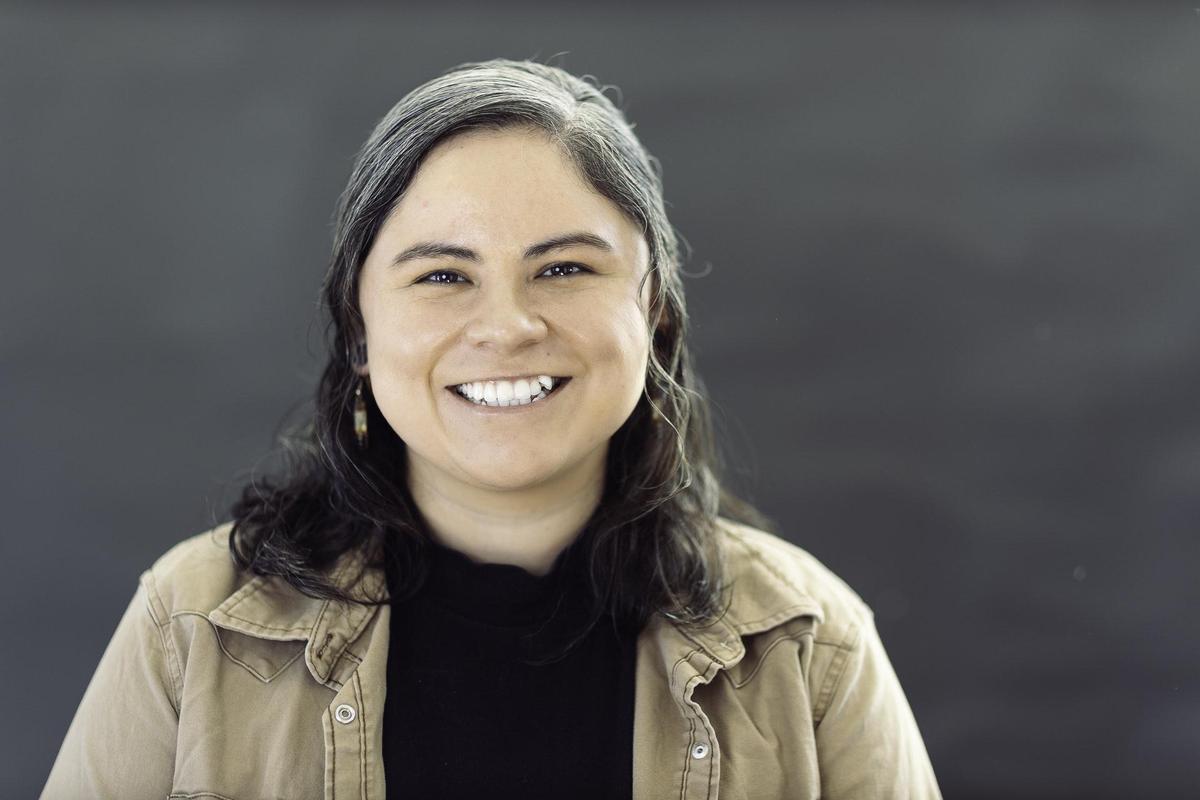 Tiarra (she/her) is Oglala Lakota from Pine Ridge, SD. In her work, Tiarra brings with her a love for learning through her experiences in Indigenous school design as a former NACA-Inspired Schools Network Fellow (‘18-’20), teaching as an adjunct instructor in the College of Education and Behavioral Sciences at Black Hills State University, and as a former full-time cattle rancher. She holds a B.A. from Stanford University ‘17 in Comparative Studies in Race and Ethnicity with an emphasis in Education, Access, and Equity, an Ed.M. from the Harvard Graduate School of Education ‘21 in Education Policy and Management, and is a current Ed.D. student at UNM in the Promoting our Leadership, Learning, and Empowering our Nations (POLLEN) Educational Leadership doctoral program.
Tiarra (she/her) is Oglala Lakota from Pine Ridge, SD. In her work, Tiarra brings with her a love for learning through her experiences in Indigenous school design as a former NACA-Inspired Schools Network Fellow (‘18-’20), teaching as an adjunct instructor in the College of Education and Behavioral Sciences at Black Hills State University, and as a former full-time cattle rancher. She holds a B.A. from Stanford University ‘17 in Comparative Studies in Race and Ethnicity with an emphasis in Education, Access, and Equity, an Ed.M. from the Harvard Graduate School of Education ‘21 in Education Policy and Management, and is a current Ed.D. student at UNM in the Promoting our Leadership, Learning, and Empowering our Nations (POLLEN) Educational Leadership doctoral program. 